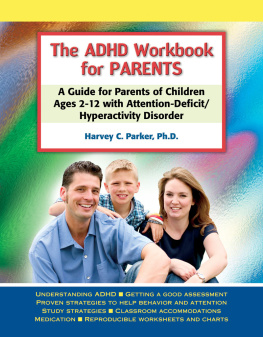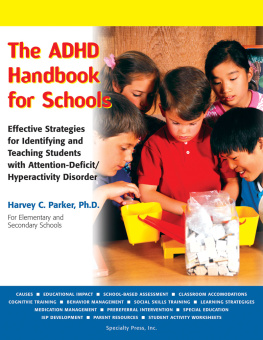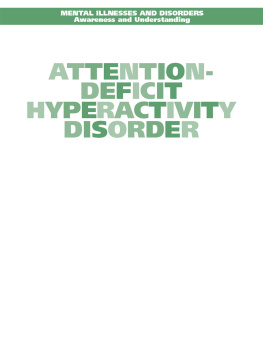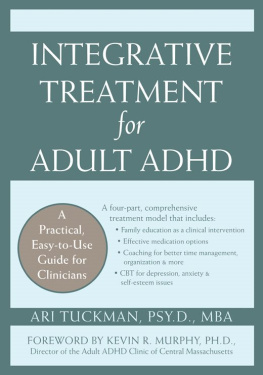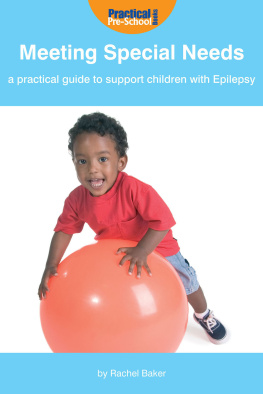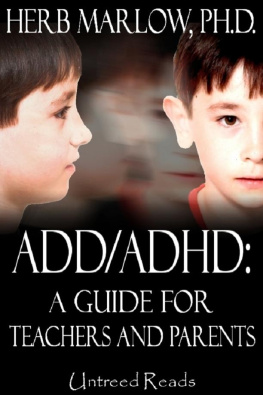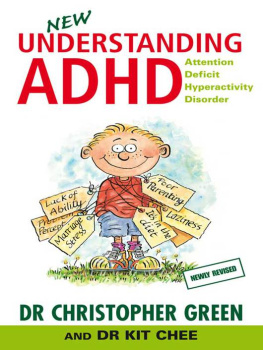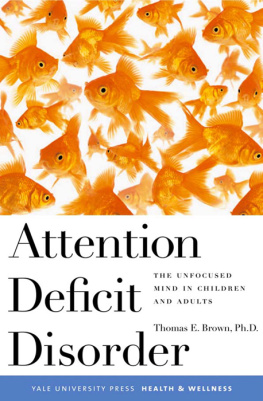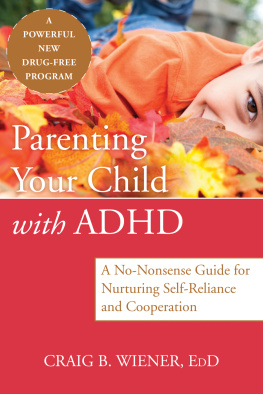
Copyright 2005 Harvey C. Parker
Second Printing 2008 All rights reserved.
No part of this book, except those portions specifically noted, may be reproduced or transmitted in any form or by any means now known or to be invented, electronic or mechanical, including photocopying, recording, or by any information storage or retrieval system, without written permission from the author, except for brief quotations. Requests for permission or further information should be addressed to the publisher.
Specialty Press, Inc.
300 Northwest 70th Avenue, Suite 102
Plantation, Florida 33317
(954) 792-8100 (800) 233-9273
Printed in the United States of America
ISBN-10 1-886941-62-9
ISBN-13 978-1-886941-62-5
Library of Congress Cataloging-in Publication Data
Parker, Harvey C.
The ADHD Workbook for parents: a guide for parents of children ages 2-12 with attention-deficit/hyperactivity disorder/Harvey C. Parker
p.cm.
ISBN 1-886941-62-9 (alk. paper)
1. Attention-deficit hyperactivity disorder. 2. Hyperactive chldren. I. Title RJ506.H9P375 2005
649.154_dc22
2005051564
To Roberta, Julia, Jason, Michelle, Simon, Hartley and Halle.
Table of Contents
Chapter 1 What is ADHD?
A June 2005 report released by the Center for Disease Control indicated that about five percent of children in the United States suffer from difficulties with emotions, concentration, behavior, and getting along with others. These children and their parents and caregivers are often upset and distressed by these difficulties and require support and services. Children with Attention-Deficit/Hyperactivity Disorder (ADHD) make up a significant proportion of this group.
Hardly a day goes by that there isnt an article published in a local newspaper, national magazine, or on the Internet about ADHD. Television talk show hosts have addressed the topic and professional journals and texts in psychology and medicine contain numerous research papers on this disorder. Parent support groups have been forming since the mid-1980s throughout the world to assist families of inattentive and hyperactive children and provide a forum by which parents could exchange information and experiences about raising a child affected by ADHD. In the past ten years, interest in ADHD in adulthood has skyrocketed as we have become aware that this is not just a childhood disorder, but one that can significantly impact the lives of adults as well.
Some of the fervor about ADHD has to do with the medication controversy surrounding the treatment of ADHD. Perhaps interest in the disorder is being generated by parents advocating on behalf of their children to ensure their rights to quality education. Perhaps more attention is being paid to ADHD because weve come to realize that it has very important long-range consequences as we learn that it can have a serious impact on the educational achievement, career attainment, mental health, and overall quality of life of sufferers. No matter the reason for all this interest, it can only do some good. Its hard enough to raise children these days, let alone children with ADHD. Both the parents of children with ADHD, and the children themselves, need help.
Most parents of children with ADHD feel alone. As awareness of ADHD grew, parents found information and support in books, articles, and on the Internet. They realized that the problems they and their child experienced were not unique. Mothers, in particular, and especially mothers of young children with ADHD who are hyperactive and impulsive, frequently feel estranged from other parents. Feelings of parental self-doubt, despondency, and loneliness can easily develop. When these parents meet other parents of children with ADHD, an immediate bond is formed by virtue of a common understanding. The loneliness begins to lessen. Many of these parents describe very similar experiences.
Whenever we go out to a restaurant, my husband and I spend most of our time reminding Jessica to sit still. Shes just impossible to take anywhere. Shes always going ninety miles an hour.
Robert just got his license to drive eight months ago and already hes gotten two tickets and was involved in one accident. Hes always in a rush and doesnt seem to think things out before acting.
I never know what to expect when I pick Steven up at school. I cant believe hes only four and already, everyday he gets a bad report from the teacher. I feel like its my fault. Just once Id like to pick him up and see his teacher smiling at me.
My husband and I cant understand it. We fought with Allison all night to do her homework. First, she didnt remember what to do for homework. Then, when we figured out what the assignment was, she didnt know how to do it. After a two-hour struggle, we finally got it finished. Then, to top it off, this afternoon we got a call from her teacher who told us that she didnt hand it in.
Most parents take their childrens behavior for granted. When they go to a movie, parents generally anticipate that their children will watch intently, perhaps asking once in a while for a refreshment. On shopping trips most children tag along with their parents, perhaps occasionally getting impatient and out of hand. When most parents go to open school night they are generally looking forward to seeing their childs classroom and are optimistic that theyll be warmly greeted with a good report from teachers. While such positive experiences are commonplace for most parents, they are often quite uncommon for parents of children with ADHD. Such children, due to their inherent restlessness, excitability, over-exuberance, impatience, and inattentiveness, can turn the most routine family or school day into a problematic situation. Parents frequently blame themselves for their childs problems and often try countless different ways to help their child make a better adjustment.
ADHD is a neurobiological disorder that affects between five and seven percent of the population of children and adolescents and between one and three percent of adults. It is characterized by attention skills that are developmentally inappropriate, and, in some cases, impulsivity and hyperactivity.
Symptoms typically appear in early childhood, although some children develop ADHD later as a result of brain injury from illness or injury. Symptoms may persist into adulthood and can pose life-long challenges. The official diagnostic criteria state that symptoms must occur before age seven, however, there is disagreement among researchers, some arguing that the onset criteria should be broadened to include anytime during childhood.
Early ADHD researchers were primarily concerned with the symptoms of hyperactivity and impulsivity and gave little notice to inattention as a problem. Researchers in the 1980s realized that many children had serious problems paying attention, but had no problems with hyperactivity or impulsivity. We have come to accept that although inattention may not be as noticeable as hyperactivity or impulsivity, it often causes serious problems for the child.
The name of the disorder has changed several times over the past thirty years, each change reflecting advances in our understanding of this complicated condition. The Diagnostic and Statistical Manual of Mental Disorders: Fourth Edition-TR (DSM-IV-TR) lists Attention-Deficit/Hyperactivity Disorder as the official name and specifies three types:
- Predominantly Inattentive Type for someone with serious inattention problems, but not much problem with hyperactivity/impulsive symptoms;
- Combined Type
Next page
